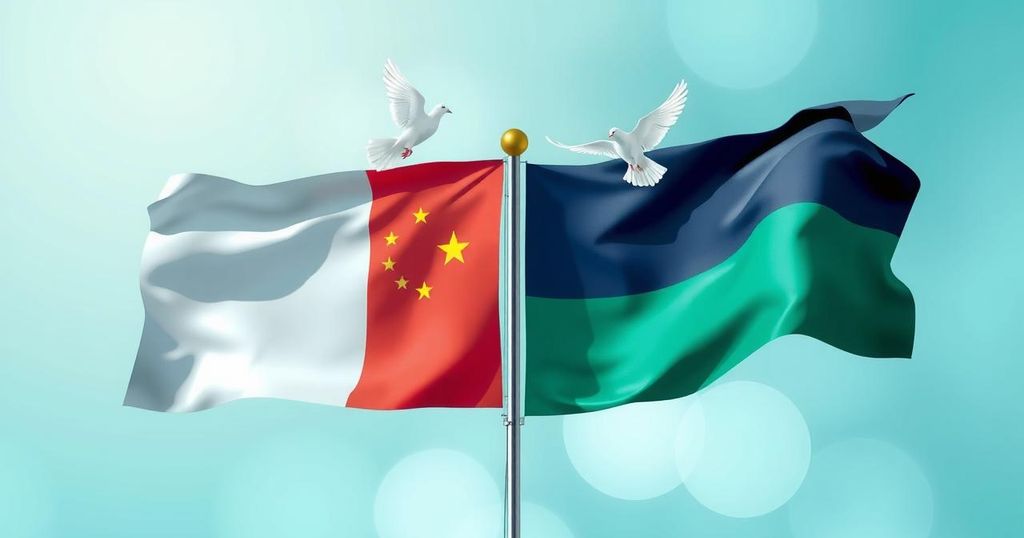Diplomats from South Korea and Ukraine are negotiating the repatriation of two North Korean soldiers captured during the Ukraine-Russia conflict. The talks highlight South Korea’s unique constitutional view on North Korean citizens and the soldiers’ willingness to defect. Nearly 12,000 North Korean troops have been deployed to assist Russia, leading to significant casualties. The negotiations’ outcomes may affect geopolitical dynamics and the humanitarian aspects of the conflict.
On March 17, 2025, diplomats from South Korea and Ukraine engaged in negotiations regarding the repatriation of two North Korean soldiers captured in the ongoing conflict with Russia. South Korean Foreign Minister Cho Tae-yul and Ukrainian counterpart Andrii Sybiha discussed the circumstances of these soldiers, emphasizing the importance of their willingness to relocate to South Korea, given the constitutional interpretation of North Koreans as citizens under South Korean law.
The discussions were fueled by North Korea’s substantial troop deployment, estimated at around 12,000 soldiers sent to support Russian forces facing manpower shortages. The impact has been profound, resulting in over 4,000 North Korean casualties, two-thirds of whom are believed to have been killed, according to Ukrainian President Volodymyr Zelensky.
Captured on January 11, 2025, the two soldiers now under the care of the Security Service of Ukraine mark a historic instance of surviving North Korean military personnel. However, their acceptance into South Korea hinges on their expressed desire to defect, which remains uncertain as they had not displayed intentions to seek asylum as of the latest reports.
Following a historical precedent, South Korea has welcomed approximately 34,000 North Korean defectors since the late 1990s. This long-standing involvement in North Korean affairs presents both an opportunity for strengthening humanitarian efforts and the risk of straining relations with North Korea and Russia.
Furthermore, Ukrainian military officials have reported that North Korean troops have been actively participating in assaults. Ukrainian official Andriy Kovalenko noted that they are attacking in “columns,” underscoring their tactical engagement. The high casualty rates among these troops could be partly due to their lack of battlefield experience, raising further security concerns in the region.
Sybiha conveyed appreciation for collaboration with South Korea, emphasizing the critical need to address the close ties between Russia and North Korea, which threatens the security of Europe, the Korean Peninsula, and the Indo-Pacific. However, the lack of expressed intent from the North Korean soldiers creates uncertainty about their future and complicates the negotiations significantly.
Contrasting views have emerged, with North Korean defector Yeonmi Park criticizing Ukraine for allegedly linking the repatriation of prisoners with arms trading, highlighting the precarious intersection of humanitarian and strategic military concerns. Additionally, President Zelensky acknowledged the perils of capturing North Korean personnel, revealing the dangers faced by Ukrainian soldiers in these undertakings.
The complexities surrounding the fate of the captured soldiers will significantly influence geopolitical dynamics, particularly regarding North Korea’s persistent silence on the proposal from South Korea. This situation exemplifies the extensive history of tension and the potential for redefined alliances amid ongoing warfare.
This article outlines the key developments regarding the negotiations between South Korea and Ukraine about the potential repatriation of North Korean soldiers. The discussions are marked by historical precedents, strategic implications, and humanitarian considerations, all intertwined with the broader geopolitical climate influenced by ongoing conflict. The ambiguity surrounding the soldiers’ intentions to defect underscores the complexity of their situation, reflecting the intricate relationship between North Korea, South Korea, and Ukraine.
Original Source: evrimagaci.org




